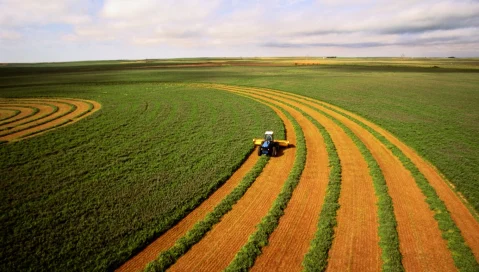Sustainable Food Production Is Vital for the Future: How Can Your Business Contribute
Sustainable Food Production Is Vital for the Future: How Can Your Business Contribute
Sustainable Food Production Is Vital for the Future: How Can Your Business Contribute
22 Déc 2021
Jack Payne
Becoming more sustainable is an imperative for many businesses around the world, but it’s a topic of special importance in the food and beverage world. With the raising of crops and livestock accounting for 25% of all global greenhouse emissions and 70% of all freshwater consumption, the positive impacts of the industry getting leaner and greener will be considerable.
And with consumers’ higher expectations for sustainable food production and social responsibility from brands they support, company leaders are committing to making a greater effort on this front. That much was made clear when sustainability was named the top trend to prioritize over the next year in IDC’s Global Food and Beverage Industry Trends and Strategic Insights whitepaper commissioned by Aptean.
For your food and beverage organization, measures taken to increase the sustainability of your operations will not only make your products more attractive to customers—you’ll also be doing the right thing by our planet and the generations to come. That, in turn, helps to ensure the longevity and long-term health of the larger marketplace.
Read on for our top reasons to get more serious about your sustainability initiatives, as well as the best ways to make progress toward a more environmentally friendly model of manufacturing and distributing your food and beverage products.
Why Your Business Needs To Be More Sustainable
As mentioned above, being known as a sustainable company can be a key advantage over competitors, but there are even more worthwhile reasons to focus on getting leaner and greener. The following are some of the most important outcomes that greater sustainability in the food and beverage industry will have.
Promoting Biodiversity
Monoculture—or the practice of planting only a single type of crop in a given area—has been found by the Union of Concerned Scientists to be harmful due to the fact that it depletes the soil of nutrients and creates additional risk for erosion. Such arrangements also frequently involve the blanket application of fertilizers, herbicides and pesticides, which can contaminate runoff water and harm local wildlife and human populations.
What’s more, a single crop is more susceptible to devastation via disease given the fact that an entire harvest can be wiped out should one plant become infected and spread to the rest. Finally, monoculture also has the negative effect of displacing naturally occurring species in the region, which can upset the ecosystem as a whole.
Planting a wider range of crops helps to make farming operations more resilient to these adverse incidents, but it just as importantly helps increase biodiversity. That leads to a healthier environment, better use of farmable land and more reliable success.
Protecting the Environment
For the time being, many critical processes in food and beverage supply chains still rely on fossil fuels. The rate of consumption can be quite high in some circumstances, as tractor and transport fuel is a constant necessity, as is the production of agrichemicals used in the cultivation of crops.
Industrial agriculture is also leading to approximately 80% of the world’s deforestation, depleting this important natural resource and destroying the homes of local fauna. In addition, this practice is removing some of the Earth’s most vital reclaimers of carbon dioxide—trees—weakening the planet’s natural recovery from activities contributing to global warming.
Further, there’s the matter of water usage in farming alluded to at the outset of this piece. Another way to understand just how much water goes into making our food, consider that a single egg requires some 52 gallons to produce. Additionally, water shortages are a particular concern with droughts increasingly common in dry climates that also serve as key growing regions, like California and the Great Plains area of the U.S.
While completely eliminating the use of fossil fuels in both your organization as well as across all of your supply chain partners isn’t likely a possibility, choosing alternative energy sources like wind, solar and hydroelectric can help shrink your own carbon footprint. Likewise, strategic planning and replanting programs can help offset the loss of trees due to the clearing of land, and regenerative agriculture and permaculture can help mitigate the amount of water necessary for agriculture.
Preserving Animal Well-Being
Factory farms subject livestock to cramped pens and cages and other inhumane practices like tail docking and debeaking. Various methods of slaughter are also problematic in that they may subject animals to unnecessary suffering.
Another concern is the overuse of antibiotics in the meat farming industry, which leads to bacterial resistances that make treatment of new variant diseases much more difficult. The proliferation of these compounds in our ecosystems also poses a risk for humans, as the same sorts of resistances that arise in bacteria that would infect animals also develop in those that would infect our populations.
Sustainable animal husbandry requires more space per animal and more natural environments including plant life, as opposed to concrete and metal enclosures, as well as humane forms of slaughter that reduce suffering and preserve dignity. It’s also crucial that only those antibiotics necessary for the treatment of an active disease should be administered to maintain the effectiveness of our medicines.
How Your Food Operations Can Become More Sustainable
While the above sections presented some very serious concerns, the ways in which farms and livestock operations can implement sustainable food production practices that were mentioned breathe give new hope for a better future. If your business is further along in the supply chain—in the manufacturing, processing or distributing stages of the journey—you can be part of the solution by working with as many like-minded partners both downstream and upstream as possible while also finding other ways to reduce your environmental impact.
Here are three strategies for sustainable food production that you can get started on straight away to make a real difference in your business’s environmental impact.
Source Responsibly
If your organization doesn’t engage in farming directly, you won’t be able to put any of the aforementioned sustainable practices into place yourself, but you can work with sources that do. Seek out farms that plant a diverse array of fruits and vegetables, leverage wind and solar energy, conserve water and practice circular agriculture and proper crop rotations. If possible, use local providers, as that lessens the need for fossil fuel consumption during transport.
If you source ingredients from overseas, it’s also important to thoroughly investigate the impacts of your partners on the local communities in which they operate. Ensure that they pay their employees a fair wage and provide safe working conditions so that everyone involved can enjoy food and water security, as well as economic opportunity.
Concerned about the potential complications of introducing new partners in your supply chain? An enterprise resource planning (ERP) solution makes it much easier to add and switch the sources of your materials with a fully configurable backend and complete bidirectional visibility. With that strong digital foundation, you can be empowered to work with other more sustainable companies.
Reduce Waste
Reducing waste in a manufacturing or processing setting requires good inventory management and a sound approach to tracking shelf lives and expiration dates so that you can make the best use of your ingredients before they go bad. The industry standard is to employ a first-expiry, first-out (FEFO) picking method, so if your business isn’t already operating under that model, rectify the matter promptly.
Predictive maintenance on your equipment and routine quality checks are also vital in waste reduction, as a malfunction and errors in formulation or processing can render entire runs useless. Relying on human memory and attention to detail here isn’t ideal—technology can handle these matters with greater reliability and accuracy.
An ERP specific to the food and beverage industry can cover all of these bases with features dedicated to each of the tasks. You’ll know exactly what’s in stock and where your levels stand with a unified database that updates in real time, and the system can automatically schedule routine equipment tune-ups and evaluations of products as they come off the line.
Increase Efficiency
Inefficiencies in your processes not only slow down your production lines, they also contribute to waste when they involve excessive use of your materials. Finding the root cause of the issues in your procedures can be difficult, though, especially if you don’t have a solution in place that gathers performance data, makes key metrics highly visible and performs robust analysis.
A dedicated food ERP can help you get to the bottom of what’s causing any hold-ups or errors that are occurring on your shop floor. Because these platforms are constantly collecting information, piping it into the interface and identifying anomalies that may require intervention.
Automation is one more way that your operations can become more efficient, as the more you are able to offload certain tasks onto machines, the more your staff can concentrate on crucial responsibilities that only a trained worker can perform. Advances in IoT and smart device technology are making the incorporation of these valuable assets into your factories much easier and more streamlined, but the purpose-built Aptean Food & Beverage ERP makes it even simpler by offering all of the latest integrations via a Microsoft Dynamics 365 framework.
Making Sustainable Food Production a Reality
It takes investment and effort at every step in the supply chain to make the food and beverage industry more sustainable. The payoff of a better future and healthier environment will be well worth the work we put in, but that doesn’t make it any less of a challenge.
Fully modernizing your operations should be the top priority if you’re currently still relying on manual processes or paper records for your critical processes and data. The ERP systems that we’ve discussed here make for the ideal foundation for a digital transformation, as they act as a “single source of truth” across the organization and tie together all departments with their cross-functional nature.
And you need to ensure that whatever ERP platform you choose, it is built with food and beverage businesses in mind. That’s the only way to guarantee that you’ll have the tools you need to conduct the highly specialized tasks that make up your day-to-day activities.
Once your solution is in place, you’ll be ready to set up your supply chains with more sustainable partners, manage inventory effectively to reduce waste, root out inefficiencies and automate to get even leaner and more agile. That way, you can be a part of the change that’s going on to protect our planet and the welfare of millions around the world.
Ready to learn more about how our purpose-built ERP for food and beverage production, Aptean Food & Beverage ERP, can help you make progress toward your business’s sustainability goals? Contact us today.
Prêt à transformer votre entreprise ?
Nous avons les solutions ERP spécialisées dont vous avez besoin pour relever les défis de votre secteur.



